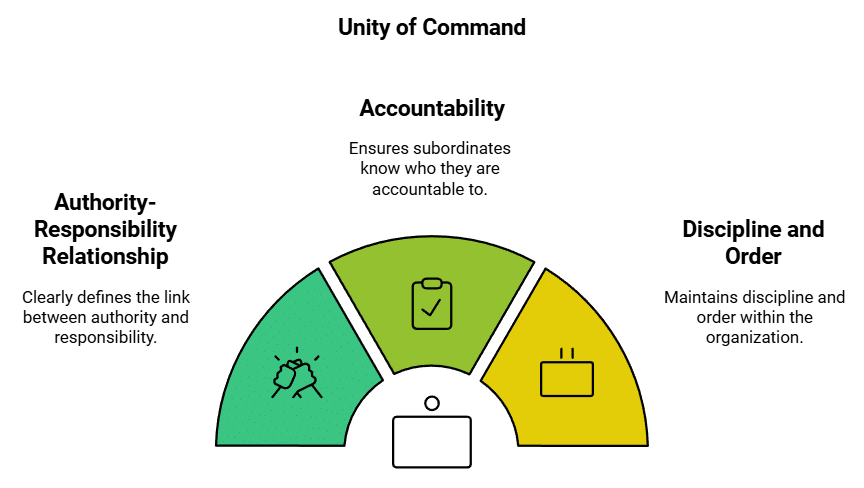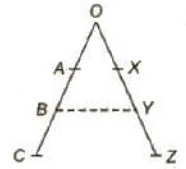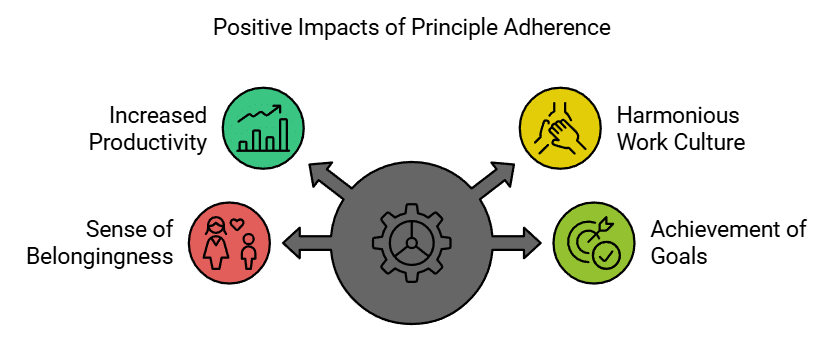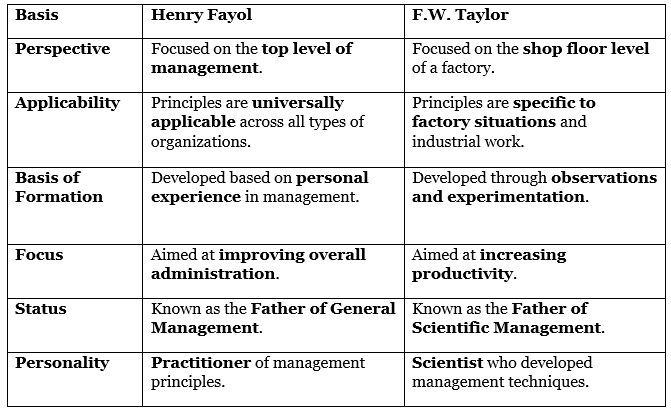Principles of Management NCERT Solutions | Business Studies (BST) Class 12 - Commerce PDF Download
Very Short Answer Type Questions
Q1: What makes principles of management flexible?Ans: Management principles are not fixed or rigid; they serve as prescribed guidelines that managers can adapt to different situations. They offer flexibility, allowing managers to modify and apply them based on the specific needs of the moment. Additionally, each principle functions as a distinct tool designed to serve a particular purpose, leaving it to the manager's discretion to select and utilize the appropriate tool for varying circumstances.
Q2: State the main objective of time study.
Ans: The primary objective of the time study is to establish a standard time limit for completing a specific job. By measuring the time required to complete the task, a standard time can be determined. This information is crucial for deciding the number of workers needed for a particular task and calculating their wages accordingly.
Q3: Name the principle that is an extension of the ‘harmony, not discord’.
Ans: Cooperation, not individualism is the extension of the principle 'harmony, not discord'.
Q4: State any two causes of fatigue that may create hindrance in the employee’s performance.
Ans: Two causes of fatigue that may create hindrance in the employee's performance are:
- Long working hours
- Uncordial relationship with the superior
Q5: SanakLal and Gagan started their career in Wales Limited (a printing press) after going through a rigorous recruitment process. Since they had no prior work experience, the firm decided to give them one year to prove themselves. Name the principle of management followed by Wales Limited.
Ans: The principle of management followed by Wales Limited is 'Stability of Personnel'.
Q6: Which technique is used by Taylor for distinguishing efficient and inefficient workers?
Ans: The technique used by Taylor for distinguishing between efficient and inefficient workers was the Differential Piece Wage System.
Short Answer Type Questions
Q1: How is the Principle of ‘Unity of Command’ useful to management? Explain briefly.Ans: The principle of Unity of Command Implies that each and every subordinate should have one and only one boss Orders and instructions should come from only one head This helps the working of any organisation in the following manner
- Authority responsibility relationship Is clearly defined.
- Subordinates are known for whom they are accountable.
- Discipline and order is maintained.

Q2: Define scientific management. State any three of its principles.
Ans: Scientific management can be defined as knowing exactly what you want men to do and seeing that they do it In the best and cheapest way. Scientific management aims at choosing the best. Method to get the maximum output from the workers the principles of scientific management are mainly applicable to the shop-floor level.
Three principles of scientific management are as follows
- Science, Not Rule of Thumb When different managers use their own different methods to get the work done it is a rule of thumb. Taylor believed that there was only one best method to maximise efficiency. Taylor advised that every organisation should compare the results of different methods, test them again and again and finally select one best method of getting the work done.
- Harmony, Not Discord Managers are an extension of the management and serve as a link between workers and the owners. Workers have to take instructions from the managers and managers have to get the work done through the workers. Oftentimes the relationship between them is spoilt which is very harmful to everyone, managers and owners. This class conflict should be replaced by harmony between the two. Both should change their thinking towards each other. Both should give importance to each other. This is known as mental revolution.
- Co-operation, Not Individualism There should be complete cooperation between the labour and the management instead of individualism. This principle is an extension of the principle of ‘Harmony, not discord.’ The management and the workers should not compete with each other but rather cooperate with each other. Management should consider all good suggestions made by the employees which can help in cost reduction. At the same time, workers should never think of going or sticking in order to get their unreasonable demands fulfilled.
Q3: If an organisation does not provide the right place for physical and human resources in an organisation, which principle is violated? What are the consequences of it?
Ans: The principle of order is violated if an organisation does not provide the right place for physical and human resources. If this principle is violated then
- Lots of time will be wasted in locating the different resources.
- This will lead to delayed decisions.
- Wastage of energy will lead to inefficiency and delay In production.
- Causes hindrance in the activities of business.
Q4: Explain any four points regarding significance of principles of management.
Ans: Significance of principles of management
- Providing Managers with Useful Insights into Reality When managers follow principles it adds to their knowledge, ability and understanding of managerial situations and circumstances. This improves managerial efficiency e.g., when managers use the principle of delegation then they get more time to concentrate on critical areas of working.
- Scientific Decision Making management principles help in thoughtful decision-making, They emphasise on logic rather than blind faith. Here, decisions are based on the objective assessment of the situation.
- Optimum Utilisation of Resources and Effective Administration Principles help managers to conceptualise the net effect of their decision rather than going for trial and error method resulting in saved time, effort and energy thereby increasing productivity.
- Management Training, Education and Research Principles of management are the base for management theory. As such they are used as a basis for management training, education and research. These principles provide basic groundwork for the development of management as a subject. Professional courses like BBA, MBA also teach these principles as part of their curriculum.
Q5: Explain the principle of ‘Scalar Chain’ and gang plank.
Ans: The formal lines of authority from highest to lowest ranks are known as scalar chains. According to Fayol, “Organisation should have a chain of authority and communication that runs from top to bottom and should be followed by managers and subordinates.

In the diagram, O is heading 2 teams where A and X are at the same level, B and Yare at the same level and C and Z are at the same level. The line of communication is clearly defined A to B to C and X to Y to Z. Authority responsibility relationship is also very clear. But C and Z cannot directly contact each other. This some times may take lot of time during an emergency to communicate as per the prescribed flow to avoid this problem a system known as ‘Gang Plank’ was introduced where in Cor Z could contact each other and same way Band Y could contact each other.
Q6: A production manager at top level in a reputed corporate, Mr. Rathore holds the responsibility for ordering raw material for the firm. While deciding on the supplier for the financial year 2017-18, he gave the order to his cousin at a higher price per unit instead of the firm’s usual supplier who was willing to lower the rates for the order. Which principle of management was violated by Mr. Rathore? What are the positive impacts of following the above identified principle?
Ans: The management principle violated by Mr Rathore is 'Subordination of Individual Interest to General Interest'. This principle states that organizational goals must take precedence over the personal interests of any individual. Employees within an organization should ensure that their personal interests do not interfere with or compromise the organizational objectives in any way.
Positive impacts of adhering to this principle include:
- Increased Productivity: Ensures focus on organizational goals, leading to better outcomes.
- Harmonious Work Culture: Promotes cooperation and minimizes conflicts.
- Sense of Belongingness: Encourages employees to feel connected and committed to the organization.
- Achievement of Organizational Goals: Aligns individual efforts with the organization’s objectives, ensuring success.

Long Answer Type/ Essay Type Questions
Q1: Explain the Principles of Scientific management given by Taylor.Ans: The principles of Scientific management given by Taylor are:
- Science, Not Rule of Thumb When different managers use their own different methods to get the work done it is a rule of thumb. Taylor believed that there was only one best method to maximise efficiency. Taylor advised that every organisation should compare the results of different methods, test them again and again and finally select one best method of getting the work done.
- Harmony, Not Discord Managers are an extension of the management and serve as a link between workers and the owners. Workers have to take the instructions from the managers and managers have to get the work done through the workers. Sometimes the relationship between them is spoilt, which is very harmful to everyone, managers and owners. This class conflict should be replaced by harmony between the two. Both should change their thinking towards each other. This is known as mental revolution.
- Co-operation, Not Individualism There should be complete cooperation between the labour and the management instead of individualism. This principle is an extension of the principle of harmony, not discord. The management and the workers should not compete with each other but rather cooperate with each other. Management should consider all good suggestions made by the employees which can help in cost reduction. At the same time, workers should never think of going on strikes in order to get their unreasonable demands fulfilled.
- Development of Each and Every Person to His or her Greatest Efficiency and Prosperity Scientific management also stands for worker development. Taylor believed that workers should be aware of the ‘best method’. On the other hand, all organisations should select employees carefully in order to get maximum efficiency. When the duties are allotted, the perfect match should be made between the requirements of the job and the capabilities of the worker. Training should be provided to improve the skills further. In this way, efficiency will go higher resulting in prosperity for both workers and the company.
Q2: Explain the following Principles of management given by Fayol with examples:
(a) Unity of direction
(b) Equity
(c) Espirit de corps
(d) Order
(e) Centralisation and decentralisation
(f) Initiative
Ans: Fayol introduced general principles of management Some of them have been explained below
(a) Unity of Direction: All the units of an organisation should be moving towards the same objective Each group of activities having the same objective must have one head and one plan. Each group should have its own charge and on no account the working of two divisions neither be overlapped.
(b) Equity: This principle emphasises kindliness and justice in the behaviour of managers towards workers. This will ensure loyalty and devotion Lazy personnel should be dealt with sternly and strictly There should be no discrimination against anyone on account of gender, religion, caste language or nationality etc All decisions should be merit-based
(c) Espirit de Corps: This principle emphasises on building harmony and team spirit among employees. In a large organisation large work force teamwork is very important. Teamwork leads to better coordination while working. The head of each team should give credit for good result to the whole team rather than confining it to his self.
(d) Order: A place for everything and everyone in his/her place. Basically, it means orderliness. If there is a fixed place for different things in a factory and they remain In their places then no time is wasted In locating them Same way if every personnel is allocated an area to operate from then his co-workers head or subordinates, anyone can contact him easily.
(e) Centralisation and Decentralisation: Concentration of authority in a few hands is centralisation and its dispersal among more people is decentralisation Fayol believed that an organisation should not work with any of them in isolation A combination of both is important simple, easy and work of routine type should be decentralised and critical important type of work should be centralised.
(f) Initiative: Initiative means taking the first step with self-motivation workers should be encouraged to develop and carry out their plans for improvements according to Fayol. Initiatives should be encouraged. A good company should Invite suggestions from employees which can result in substantial cost/time reduction Rewards can be given for fruitful suggestions.
Q3: Explain the technique of ‘Functional Foremanship’ and the concept of ‘Mental Revolution’ as enunciated by Taylor.
Ans:
Functional Foremanship: Functional foremanship is an extension of the principle of division of labour, emphasizing specialization. According to Taylor, neither a single worker nor a single supervisor can be an expert in all aspects of work. To address this, he proposed appointing eight foremen to guide workers, divided into planning and production departments.
Under the Planning Incharge:
- Route Clerk: Specifies the route for production.
- Instruction Card Clerk: Provides detailed instructions to workers.
- Time and Cost Clerk: Prepares time and cost sheets.
- Disciplinarian: Maintains discipline among workers.
Under the Production Incharge:
- Speed Boss: Ensures timely completion of jobs.
- Gang Boss: Prepares machines and tools for work.
- Repair Boss: Keeps machines and tools in proper working condition.
- Inspector: Maintains the quality of work.
Mental Revolution: Mental revolution refers to a complete change in the attitudes of both workers and management.
- Both parties must understand the importance of cooperation and aim to maximize the size of the surplus.
- Managers should share their gains with workers, while workers should focus on contributing to increased profits.
- This shift in attitude will ensure prosperity for both the company and its workers, leading to overall growth and success.
Q4: Discuss the following techniques of Scientific Work Study:
(a) Time Study
(b) Motion Study
(c) Fatigue Study
(d) Method Study
(e) Simplification and standardisation of work
Ans: Some of the techniques of scientific work study are
(a) Time Study: It determines the standard time taken to perform a well-defined job. The standard time is fixed for the whole of the task by taking several readings. The method of time study will depend upon the volume and frequency of the task, the cycle time of the operation and time measurement costs There are three objectives achieved through time study
- Determine the number of workers
- Frame suitable incentive schemes
- Determines labour costs. e.g. If the standard time taken to do a piece of work is 20 minutes then one work can be done 3 times In an hour and total of 21 times (3 x 7 hours per day) the work can be done on a single day.
(b) Motion Study: Motion study refers to the study of movements like lifting putting objects sitting and changing pos. non On close examination of body motions e.g., It IS possible to find out three types of motions
- Productive motions.
- Incidental motions.
- Unproductive motions.
Out of the above three workers were motivated to eliminate the third type and reduce the second one to the minimum This help in increasing productivity.
(c) Fatigue Study: A fatigue study seeks to determine the amount and frequency of rest intervals in completing a task. A person is bound to feel tired physically and mentally if he does not take rest while working. The next intervals will help one to regain stamina and work again with the same efficiency e.g., in an organisation working hours are 9 to 5. There is a lunch break of an hour for the workers to take rest similarly In a school there is a break for the students and teachers after 4 periods of continuous learning.
(d) Method Study: The objective of a method study is to find out the best way of doing the job. Different managers would use their different methods of getting the work done. But there is always one best method. Right from procurement of raw materials till the final product is delivered to the customer every activity is the part of method study. The objective of the whole exercise IS to minimise the cost of production and maximise the satisfaction of the customer.
(e) Simplification and Standardisation of Work: Standardisation refers to the process of setting standards for every business activity e.g., process, raw material, time, product, machinery, methods or working conditions. The objectives of standardisation are
- To reduce products to fixed types, sizes, features etc.
- To establish interchangeability of various parts.
- To establish standards of excellence and quality in materials.
- To establish standards of performance of men and machines.
Simplification aims at eliminating unnecessary diversity of products. It results in savings on cost of labour, machines and tools. It implies reduced inventories, fuller utilisation of equipment and increasing turnover.
Q5: Discuss the differences between the contributions of Taylor and Fayol.
Ans: Differences Between Henry Fayol and F.W. Taylor

Q6: Discuss the relevance of Taylor and Fayol’s contribution to the contemporary business environment.
Ans: Relevance of Taylor and Favors's contribution in the contemporary business environment. Both Fayol and Taylor have given principles of management to improve efficiency In an organisation. Taylor gave us scientific principles of management which are being adopted by all organisations to improve productivity at the shop floor level, the principles help in giving effective results. In the same manner, Henry Fayol gave general principles of management which when implemented at any of the levels- top, middle or lower and helps in achieving better co-ordination, remove ambiguity and encourage the employees to improve their work performance.
Q7: ‘Bhasin’ Limited was engaged in the business of food processing and selling its products under a popular brand. Lately the business was expanding due to good quality and reasonable prices. Also with more people working the market for processed food was increasing. New players were also coming to cash in on the new trend. In order to keep its market share in the short run the company directed its existing workforce to work overtime. But this resulted in many problems. Due to increased pressure of work the efficiency of the workers declined. Sometimes the subordinates had to work for more than one superior resulting in declining efficiency. The divisions that were previously working on one product were also made to work on two or more products.
This resulted in a lot of overlapping and wastage. The workers were becoming in-disciplined. The spirit of teamwork, which had characterized the company, previously was beginning to wane. Workers were feeling cheated and initiative was declining. The quality of the products was beginning to decline and market share was on the verge of decrease.
Actually the company had implemented changes without creating the required infrastructure.
Q.1. Identify the principle of management (out of 14 given by Henry Fayol) that were being violated by the company.
Ans: The company violated following principles
- Division of work
- of command
- Unity of direction
- Discipline
- Subordination of individual interest to general interest
- Order
- Initiative
- Remuneration
Q.2. Explain these principles in brief.
Ans:
- Division of Work: As per the case work is not divided among the workers as per their specialisation. Specialisation is the most efficient way to use human efforts and produce more and better work.
- Unity of Command: In this case, subordinates had to work for more than one superior. This results in declining efficiency. As per Fayol’s principle of unity of command, there should be one boss and if it is violated it results in authority being undetermined, discipline being in jeopardy, order being distributed and stability being threatened. Same as we are observing in the above case.
- Unity of Direction: The units of an organisation should be moving towards the same objective. Each group must have having same objective and must have one head and one plan. But in this case first, the producers are working on one product and then moved to two or more groups. Thus, this principle is also violated.
- Discipline: In this case, there is a lack of formalised control as the workers are working beyond their abilities. There are no rules and regulations as well as a lack of employment agreement.
- Subordination of Individual Interest to General Interest: Every individual is working better only when the organisation is giving priority to their general interest. In this case, a company is only focusing on its objective not on employees.
- Order: People and materials must be in suitable places at appropriate times for maximum efficiency. But In case they are not following the order of anything.
- Initiative: It implies that workers should be self-motivated, and suggestions should be taken from the employees. It results in substantial cost and time reduction but here they are taking no feedback, no suggestions.
- Remuneration: The workers should get fair wages but in case workers are performing day and night they are not getting a fair amount for the same. This results in they are feeling cheated.
Q.3. What steps should the company management take in relation to the above principles to restore the company to its past glory? Answer Following steps should be taken by the company to retain its past glory:
Ans:
- Work is divided into small tasks and distributed among the employees as per their specialisation.
- There should be one boss.
- Functions should be performed under one head or one plan.
- Formalised control should be maintained.
- Proper remuneration and Impressive Incentives should be given
- A hierarchical communication pattern is to be followed
- Suggestions and feedback should be taken from the employees.
- Maintain high morale among employees.
The management of company Bhasin now realised its folly. To rectify the situation, it appointed a management consultant ‘M consultants’ to recommend a restructuring plan to bring the company back on the rails. ‘M consultants’ undertook a study of the production process at the plant of the company Bhasin and recommended the following changes:
- The company should introduce scientific management of production.
- Production Planning including routing, scheduling, dispatching and feedback should be implemented.
- To separate planning from operational management ‘Functional foremanship’ should be introduced.
- Work study should be undertaken to optimise the use of resources.
- ‘Standardisation’ of all activities should be implemented to increase efficiency and accountability.
- To motivate the workers a differential Piece Rate System’ should be implemented.
- The above changes should be introduced apart from the steps recommended.
|
51 videos|230 docs|49 tests
|
FAQs on Principles of Management NCERT Solutions - Business Studies (BST) Class 12 - Commerce
| 1. What are the main functions of management as per the principles of management? |  |
| 2. How does the principle of unity of command influence management? |  |
| 3. What is the importance of planning in management? |  |
| 4. Can you explain the concept of delegation in management? |  |
| 5. What role does leadership play in the principles of management? |  |






















